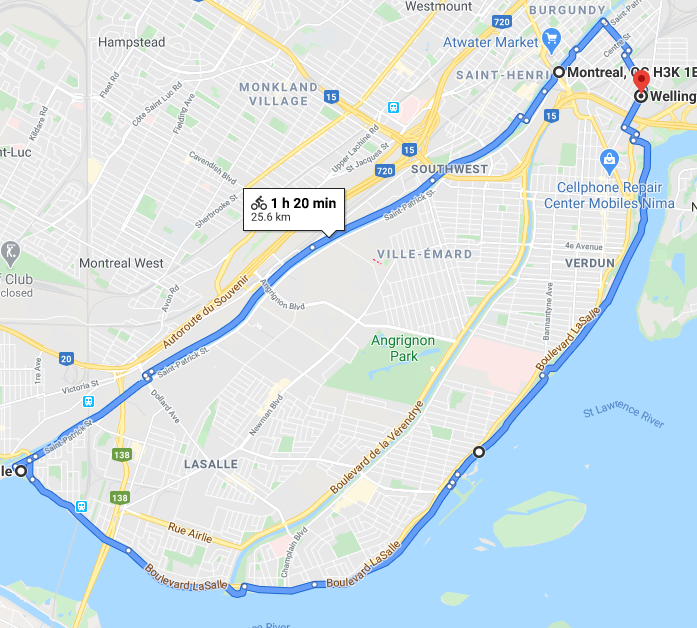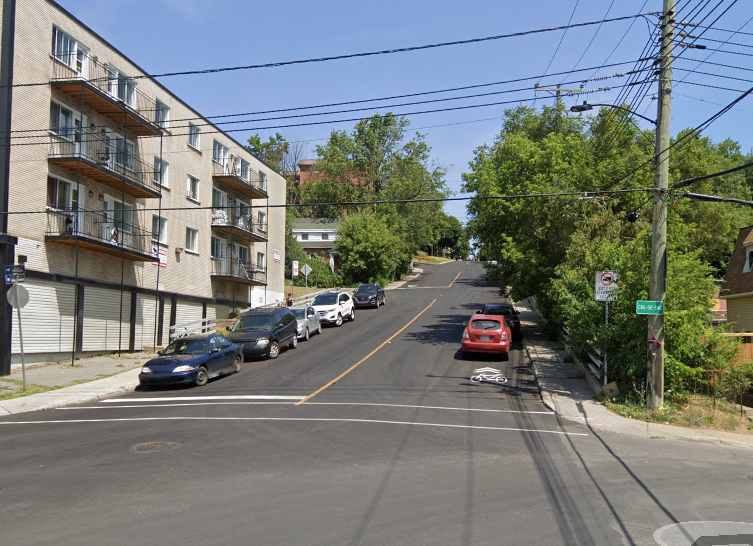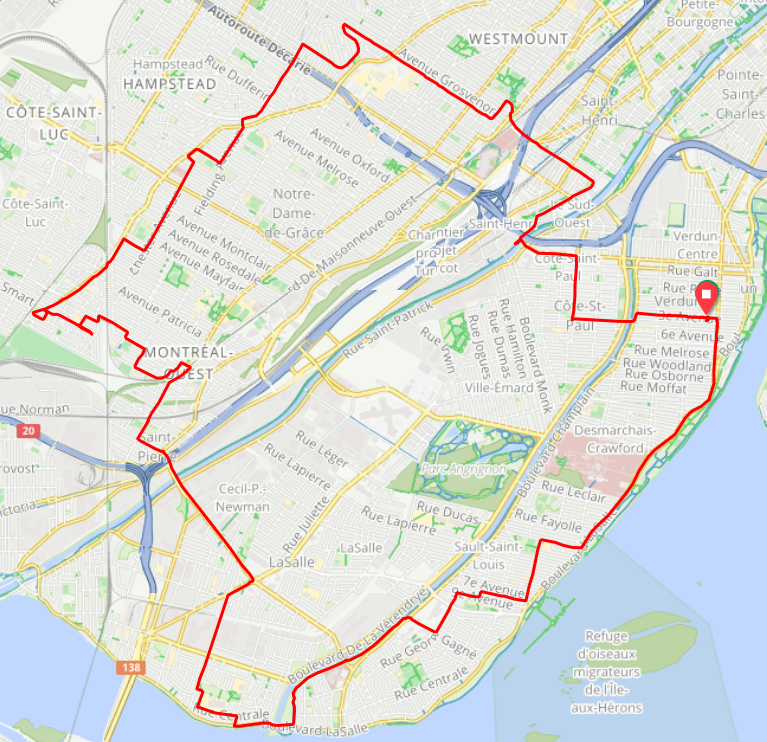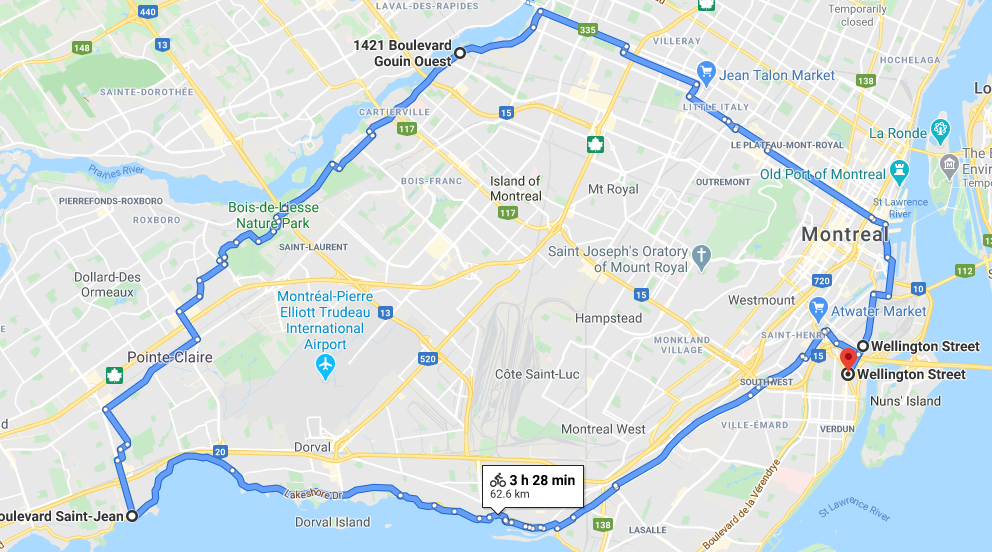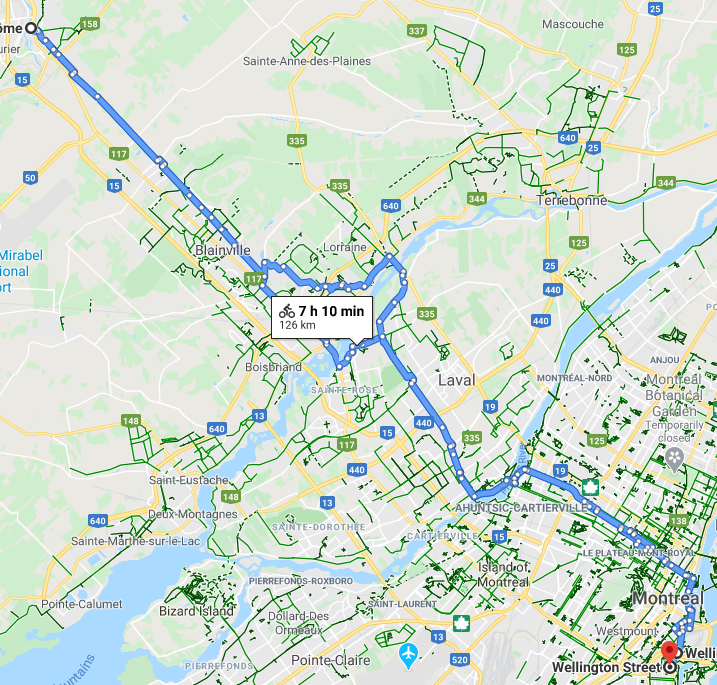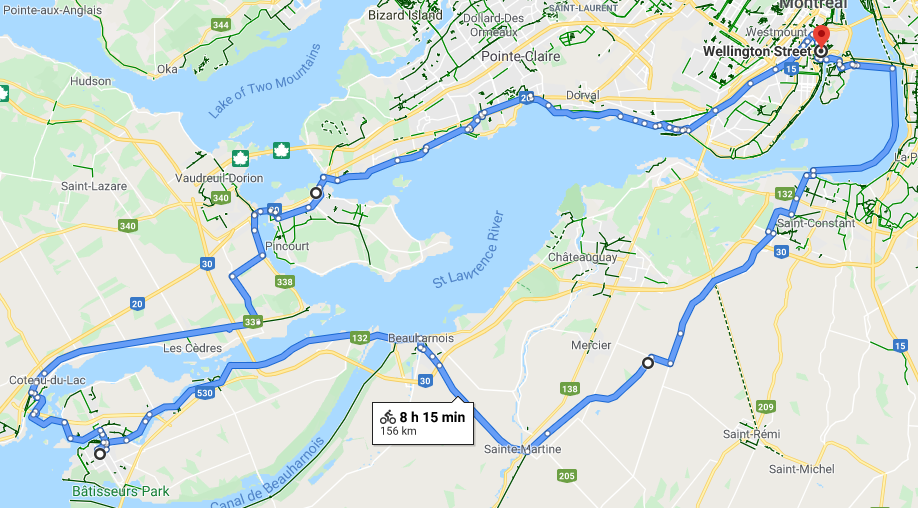WARNING: LONG
I figure I'll start off with a relatively long post to give the blog a bit of meat. This post is mainly for me (I've never actually written out the whole story of this before), so it'll meander a lot before it comes back to the title question, and even then, probably won't address it very well, but if anyone's interested, they're welcome to read it. TL;DR at the bottom. I promise I'll be more together on future posts.
Anyway, with regards to the title of this post, I never really started asking myself the question prior to a few years ago. I was always so focused on what was infront of me, and with keeping busy, that I never really actually sat down and thought about where I was in my life, and where I was going. It was easier, earier in life, when I was in elementary school, high school, CEGEP, and university, because the answer to "Where are you going?" was always "graduation", and I never really had to think about it much beyond that. Sure; I made some career choices, but that's hardly an existential dilemna. Choosing a career path doesn't really evoke the larger question about why we're here, or what makes life worth living, at least, not in the same way it does when you're actually faced with this question and nothing else to do.
I feel like a lot of people my age are in a similar boat to this; never really having asked this question, and given what's going on with COVID-19, I'm sure a lot of them are really staring down the barrel of this question for the first time.
Anyway, for the me of a year and a bit ago, this was problematic for a number of reasons, but chief among them was that I slowly, and inexorably let myself be drawn into a living situation that I really, deep down, didn't like. Not only was I drinking too much (generally only on weekends, but even so, I'm not 20 anymore; and don't need to get fucked out of mind every single weekend), but I was also slowly letting my job dominate my life to the exclusion of everything else.
Even though I kept telling myself I was only working 40 hours a week, and that I shoudln't be even consider being worried about that, given how much longer some people work; it wasn't really the hours at work that were the problem. It was the job I was doing, and how much I thought about it after I had signed off for the day.
Some Context
Though I am a developer by trade, the inevitable result of developing something is that that something needs support. Especially if people are paying for it. The more successful it is, generally the more support it needs. Back in 2012, I started a small company with a few friends, all of whom were developers. And so, though I started in the role of a developer, as the product(s) we were making became more popular, I shifted ever so slowly into the role of customer support as our business needs shifted. And the problem was, I was good at it. I never really expected that I'd be particularly personable, but our customers loved it; we racked up hundreds of 5/5 star reviews on our products, with 1 or 2 reviews less than that; that was it. And so, slowly, day by day, every single bit of my day was slowly subsumed into talking with clients, and fixing their never-ending list of problems, rather than actually developing things. It was seemingly satisfying, but not what I'd originally signed up for.
The problem with all this is, it's difficult to turn off this kind of sympathy for the clients after you go home. I'd think about them, and their businesses that were supporting with our software. I'd flesh out our interactions into real relationships with the client; and I actually started caring about when our software was making their life more difficult, rather than easier (thankfully, fairly uncommonly). I'd say 98% of all interactions I had were great, talking with fantastic people who were very nice, and understanding of any roadblocks they were having. It was stressful when things were going wrong for them, but ultimately, those interactions were usually all very positive. The issue was with that remaining 2%, and I think it's part of what broke me in that role. The other part, was the constant vigilance required when you're running a service for people that should work 24/7.
That 2%
Some people, unfortunately, you can't please. No matter what you do. You can give them all their money back, do hours, and hours of free work for them, in hopes that they won't give you a bad review, and in the end, that may not be enough. Some people, I've convinced, are legitimately mentally ill, or so maliciously aggressive and unresonable that they might as well be. You can do your absolute best for these people, and in the end, they'll shit all over you for it. It really made me feel completely out of control of every new situation I was heading into; and completely vulnerable to the customer. I'd never really had the courage to fire a customer, and so trying to get rid of these people was next to impossible (another part of this was that these people rarely read e-mail you send them (even though they may be sending you lots), or answer their listed phone numbers). This was one problem.
24/7
The other problem was that the service was running 24/7. It should be; it's an automated service. So I'd taken to keeping an eye on my email/tickets after hours; just to ensure that nothing was going really wrong. And of course, this would lead to me seeing people emailing in questions. Given that a lof of the answers to these were super easy, and took literally 2 minutes to type out; I figured, why not answer? It'll only take a second, and it'll make someone's day that much better, if they get a prompt, friendly reply.
This was a huge mistake.
The Beginnings of Trouble
So, because I was always checking my email, I'd see problems coming up. I'd see problems coming in I could solve. I'd start to feel guilty about not solving them, when it was so easy for me. And so, I started devoting more and more time to watching my email. It really was a gradual process, but it got to the point where I basically never turned it off. After all, it was only a couple minutes every hour or so. Why should it matter?
The obvious problem here is that, you're basically never disconnecting from work. Always thinking about it. Even when you're supposed to be doing other things (like being on vacation, for example), there's increasingly that thought of "Is everything okay?", "What about X who just send that email in? I replied, but maybe that solution won't work? What if they're really screwed by this siutation and need me to fix it? What if they're getting pissed about me not answering after the first response?".
The second problem is that 2%. They make the support process an absolute nightmare. So not only are you never disconnecting, but out of the blue you can have these freak support requests that have no possibility of going well, no matter what you do.
So over several years, my free time was more and more monopolized by this. It was never really a requirement of the business, and my business partners certainly didn't do anything to encourage it (in fact, they told me that I needed to stop doing that; I didn't really believe them). Despite selling my shares in the business to one of my partners and removing most of my stake in the outcome of the company, this whole support business got to the point where I wasn't really able to enjoy any other activity, becuase I'd be too worried about what could be going on with the business' clients. In addition, as this happened, I started slowly shutting myself into my apartment; going to less and less stuff, mainly because it made me feel super uncomfortable and anxious. I had a panic attack or three, all of which tended to be exacerbated by hangovers, and being out and about, especially in the metro/subway. I told myself that it was just me getting older, that there wasn't really much to read into the panic attacks other than I shouldn't be leaving my house the morning after having a lot of beer. Later, as this got worse, these restrictions got more broad; soon it was, even if I wasn't really hungover, and had only had a beer or two, no leaving the house for the entire day after (usually Saturday), in case I had a panic attack. Definitely no metro riding they day after (maybe even the day after that). (Which is totally crazy, but I just assumed this was my life now, and how it had to be).
It was difficult to see what was wrong with my life, because it wasn't all bad. The issue was it was tied to work. If work was going well, I was happy. If it wasn't going well, I was anxiety-ridden and depressed. That's normal right? My job essentially became inextricably tied to my sense of self-worth. When I had free time, I'd just sit there, staring at my computer screen, and consider working. Most weekends, when I had nothing to do, I'd just open my text editor, and start coding. (Because, when else was I supposed to code, if I was going customer service all the time? I like coding.)
And then, of course, as you might guess, I had a bit of a breakdown.
The Breakdown
This was pretty obviously inevitable when you're looking from the outside in at this situation, but at the time, I had no idea what was happening. It was christmas 2018; and of course, like all vacations, I spent a lot of it working, and keeping an eye on things. Due to a fuck-up at work; in addition to all the normal stuff, I had to essentially oversee/develop a project as a favour to our sister company, and ensure that everything went fine through christmas. This of course, was totally voluntary, and no one insisted that this be done; but in my awful state of mind, I thought it'd make me feel better. So I worked through christmas 2018. Not anything close to 40 hours a week, but certainly a couple hours a day (which is nothing, right?).
I was already running on fumes as we went into the christmas vacation period, and was hoping to use it to recharge, and get better. I thought it was mostly fine. Until the office came back in January. Then, I crashed. And crashed hard.
Despite not drinking anything, on the day we were due to go back (or close to it; maybe it was a few days into being back), I headed for the metro, like any other day, to go to work. And I had a panic attack when I tried to step into the metro.
Thinking this was related to me drinking something a few days earlier, I called in sick. The next day, I didn't feel any better, so I called in sick that day too. And the rest of the week. It started getting harder to even just go outside my apartment; I was wracked with anxiety every time I left.
The problem was, this wasn't going away. It wasn't like before, where all I'd have to do is my magic ritual of waiting a few days since having a drink, and then everything'd be fine. Something about me was fundamentally broken.
I was 28 when this happened; with no significant other. So, like most people in this situation, I called the one set of people who I still, somewhere deep down, thought could fix everything. My parents. So, after an anxiety-riddled meeting in a restaurant, they suggested, and I agreed to spend a few nights at their place, to see if they could help this play out, and support me when I needed it. This was not a good idea.
My parents meant well, of course. But, as I now know, the problem was mainly one of feeling out of control of your situation. And the last thing you want to do when you need to regain some sense of control is to go and move back in with your parents.
Anyway, long story short; I'm can't remember exactly how long I spent with them; at least a week, possibly two. During this time, I (mostly) took a leave of absence from work, only checking in every few days to make sure there were no real emergencies. After a conversation with my partners, I got rid of my work email from my phone completely. That helped. But I felt mostly in a state of limbo, unable to do anything about my situation, just aimlessly existing. That's when I felt it was time to see a psychologist.
I got a referral from GP to an anxiety specialist. While that whole process was going on, I also got this book; getting my dad to pick it up when they mis-delivered it to that stupid Purolater warehouse near the 20, just off Montreal-Ouest, down that random industrial road.
The Actual Problem and the Actual Solution
Before I actually got going with the therapist, I started reading the book, and found out that I was probably experiencing agoraphobia. I never did a diagnosis in the end of anything, and I'm certainly not a doctor, but that's my guess based on what I've read. The bad news was that this wasn't likely something that would go away on its own. In fact, it would probably get worse. That was super scary.
The good news was that it's very treatable (over 90% recovery rates, according to the book), and not even with medication. (Though that can definitely be a very legitimate and necessary part of some people's treatments; I didn't need it for mine). Anti-anxiety medications (like Ativan) are generally pretty dangerous if not used carefully; and apparently dependence on those can be really serious. Obviously, in my axiety-riddled state, my first thought was "What if I'm part of that 10% that doesn't recover, even with drugs?". Of course. In the end, I did get a very small prescription for Ativan from my GP (5 small tablets), but was too anxious to take any of them, after reading what I read (obviously).
In the end, I did eventually recover. I won't bore you (more) with the minute details of every technique that I was taught to deal with this; but the five main ones that really helped me were: exposure therapy, saying no, getting more sleep, reducing alcohol intake, biking, and of course, changing my role at work.
Exposure Thrapy
This one's simple. It's basically, no matter how terrified you are, voluntarily putting yourself into a situation that makes you anxious. For me, the big one was riding the metro. It was by far the most crippling part of my anxiety; essentially, loss of mobility around the city (I don't own a car). The idea is that you slowly re-introduce yourself to these situations, on a regular basis, until they become pedestrian; boring even. e.g. Start out with just into the metro station, then going out. Then, try staying in the metro station a few minutes, without getting on a train. Then get on a train, and get off before it leaves. Then ride one stop. Then ride two. etc..
This was really, really hard, because having a panic attack is probably one of the worst things I've ever felt, and the last thing you want to do is step into a situation where one could be triggered. But it works; it really does.
Saying No
Even though this is pretty obvious, this one was really hard for me. Having built a business on fufilling every customer whim for years, it was super hard for me to actually tell anyone no; especially if I knew that I could actually say yes to whatever was being asked without much impact on myself (only my time would be in jeopardy). This is something that's really important in both the professional and personal sphere. If you don't like something you don't have to aquiesce to it.
As a probably relatable example to most people, my parents would ask me, usually weekly, over for dinner to their condo off the plateau. From my apartment, this is generally a ~1 hour trek via public transit, with the same trek back. Now, I love my parents. But that's a decent amount of time. Not a lot, which is one of the reasons that I always felt guilty about saying no. But it's not nothing. And it's okay to say no to something like this if you're tired, have an event, or just plain don't want to.
My parents are nice people. They totally understand. People in general undertsand when you say no. It's not a personal slight. It's just you saying no. And that's okay.
This took me a long time to learn. But learning to reject invitations to things I didn't want really helped me get a grip over the disaster that I felt my life was.
Sleep
This one's self-explamatory. Obviously everything is better when you're well-rested. Like, expontentially so. I had a bit of a positively-reinforcing loop here; the problem is, often (read: almost every night), I'd be so anxious about not getting enough sleep this would, of course, drive more anxiety and keep me up. Stupid, but there it is.
And luckily, there's a miracle cure for this. I don't know if it's a placebo, but it works; at least for me. It's really simple; and was recommended to me by both my doctor and psychologist. Essentially it's this: If you find you can't sleep, go to another room, and read a relatively unexciting non-fiction book for ten minutes, and then come back in your room, and try to get back to sleep.
That's it. And it really works. I can't conclusively say why, it works, but I think it's a combination of feeling like you're in control of a siutation (i.e. you have something you can do to fix the problem), and breaking any sort of anxiety-reinforcing cycles of thought by forcing you to do something else for a short period.
So I started getting a reasonable amount of sleep.
Biking
This one came a bit later. After winter was over (probably around April), I started going on bike rides. But not the regular jaunts I'd been making my life up to that point. Long rides (>70km in most cases). This just generally made me feel better about myself. Pretty sure it's because:
- It's exercise, duh. Exercise makes you feel good.
- It's freeing. You can go places purely under your own power.
- It's exciting. You can go places you'd never otherwise go, and see things you'd never otherwise see.
- It's fun. I've always liked biking; just the act of it.
Now, it's a major hobby of mine. Before, I dabbled; now I try to go for a long ride, at least once a week, possibly more.
Alcohol
Though obviously it was a pretty central problem in my life, I've always had a love-hate relationship with alcohol. If I'm honest, more love than hate. I really like drinking. It's fun, sociable, and delicious. I don't generally drink alone these days (though this COVID thing has obviously had me drinking more frequently over video chat with people), and I'm able to tell myself "no more" after a few drinks these days, so this is less of a problem than it used to be.
During my period of trying to fix my anxiety, I did abstain from drinking for many months, as the act of drinking actually caused me anxiety (not just the hangover/alcohol itself), as I knew that it was counter-indicated for this kind of thing. So I reduced my consumption to a bare minimum. I don't know how much it helped, but at the bare minimum it made me realize it's not normal to surrender 50% of your weekend because you drank a few beers. This ties a bit into "Saying No" almost, even though it's more to yourself than anyone else. It's okay to simply stop drinking when you feel you've had enough. You don't need to finish a 6-pack of beer, simply because you bought a 6-pack.
Changing Job Situation
This probably underlay everything, and took a few months to work out. Without going into too much detail; basically, I shifted my role away from customer service. In the short term, I tried to move away gradually; but when that didn't really work, one of my business partners covered for me, until we got a full customer service team up and running. Now, I work entirely on the development side again, and am pretty heavily insulated from customers. I don't even have access to the ticketing system. Which, while scary at first, has definitely had a net-positive effect on my sanity.
Recovery
Recovery from all this took about a year; I'm just basically fully coming out of it now. I've been more or less "fixed" since June or so, but little things have still lingered; and they're really resolving themselves now.
I also took a salary cut to go down to 4 days a week, instead of 5. Which gave me a ton more free time, and is sort of semi bringing us back to my original question. (Finally).
As a side-effect from this not-obsessing-over-work, and not-working-5-days-a-week, I've come into a wonderful problem. I have (or rather, I had) too much free time. This was (as everything else was) anxiety-inducing, but in the end, I managed to see it for the blessing it was.
Free Time
So, back to my original question. What do you do when you actually have free time, where you're not obsessing over work, and you're essentially starting from a close-to-blank-slate in terms of hobbies (most of mine, recall, had essentially fallen by the wayside).
So, I took a look at the constructive things I liked doing; other than seeing friends and family. My list was basically the following:
- Coding cool stuff in general
- Coding games specifically
- Reading
- Writing
- Biking
- Beer brewing
- Playing fiddle
Given that I had all this free time, I decided to pick out a few things from that list that I'd tried in the past, but never really put in the time to really develop. Mainly, 2, 4 and 5. But before I looked at those, I also considered in general how I looked at free time.
Taking the Time
One of the things that I realized after having a couple visits with my psychologist, and after having partaken in a bit of mindfulness meditation, is that there's no reason to be in a hurry for most things. Up until this point (I'm not sure when this started), I'd always tried to structure my activities in such a way that I could pack the most punch into the smallest period. I don't know why I did this. I still do it, a bit, today. If I was scheduling something with friends, I'd tried to invite as many friends as possible (even if it made the event unwieldy with people who weren't particualrly intersted in the contents). If it was something like a bike ride, I'd try to come up with destination that somehow enticed me to go; a shopping trip, or a visit to a friend's house.
This sounds sort of OK, but I've come to realize this kind of thinking and planning is really counter-produtive for me. For example, if I couldn't end up justifying a reason to bike someplace, I just wouldn't go. If I couldn't get a sufficient amount of friends organized, I'd just not host the event.
One of the big revelations I've had out of this quarter/mid-life crisis is that it doesn't matter if you have a reason for doing something, or that it's okay to just spend time with one or two people. You can do the things you like without it being the most efficient thing possible. It's okay to do things you like doing, even if it seems wasteful. Having the time, made me realize that being overly judicious with my time was actually making me way more unhappy than simply just doing things I enjoyed, and not giving a shit about how it looked, or whether or not it was efficient.
And so, I looked at my hobbies, and stopped caring about doing things efficiently, but looked what the hell I actually wanted to do.
Coding Games
A long time ago, before I did the whole software company thing, I wanted to program games. I made a basic game engine, and with a guy who did models, who lived in Texas, we produced a small demo game. A space shooter, set in an asteroid belt. It was definitely fairly primitive, but was cool, because I had programmed it from the ground up. I think one of the reasons why I stopped this kind of thing is because I got more into a company mindset; when developing software, tend to the more efficient thing, rather than what's interesting. It's fun to program your own game engine; but certainly not a good idea if you're actually looking to produce something in a timely manner. Really, it's just a distraction from producing the actual content.
However. That was what originally drew me to the industry in the first place. Creating a world from nothing (well, minus the OS, compiler, graphics cards/drivers, etc..). Almost akin to divine creation, really. That kind of thing appealed to me. To be honest one of the reasons I became a programmer in the first place, is that it struck me as a young boy, as the closest thing to being a wizard in the real world. Learning some arcane language allowed you to access the power of creation. It's not quite as extravagant as my younger self was hoping, but it still is damn satisfying to essentially write math and watch that math do things.
Anyway, so, I figured that even though it wasn't efficient, I'd just start writing another game, and engine. Sure, it's not efficient, but I enjoy almost every minute I put into it. I'll probably more blog posts about this later.
Writing
Fantasy writing is something I've always wanted to do since I was a teenager, possibly earlier. I was never really into it during my education; no teacher every really encouraged me to write. In fact, I despised creative writing assignments; they always struck me as incredibly boring and contrived (though this could just be my teenage-self being, well, a teenager). The only time I ever submitted something I actually enjoyed writing was when a substitute teacher in ninth grade asked for a creative writing piece from each of us, and I simply submitted something I'd already written an posted online; a piece of fanfiction for Chrono Trigger (this was in the early '00s). The teacher didn't comment on it; I'm not sure if he even read it. (Though, let's be honest, who in the hell actually wants to read the shit ordinary teenagers write? I don't blame the man.)
I'd written a couple stories since then; mostly incomplete overtures to novels, or half-finished outlines. Nothing concrete. I'm certainly no author, and despite reading a ton of science fiction and fantasy literature, I could never seem to get more than middling grades in my language classes in high school. Though, as I grow older, I realize that really doesn't matter very much.
Anyway, when I was in the midst of this crisis (Februrary 10th, 2019, to be exact), I finally did some deep thinking and asked myself: why? Why didn't I go further than simple outlines and a few thousand words? Inspired by some of the incremental progress in the exposure therapy I've talked about above, I decided to take a simiarly methodical approach. My previous attempts had centered around writing a lot of words every so often. Invariably, after a month or so of writing a couple thousand words a week, I'd simply let the habit lapse, and end up with only the beginnings of a story.
But, what if I took that incremental approach, and just wrote a very small amount of words every day? A ludicrously small amount of words. 250, to be exact. That's like half a page; a couple paragraphs. Surely anyone can write that, yes? And I did the math; if an average book is about 100,000 words (~350 pages), then it should take a little over a year to write one, at 250 words a day. That seemed eminently reasonable.
And, surprisingly, it was. Rather than relegating writing times to "times where I felt like it", or "times where I'm inspired", I just wrote. Even when I felt like I had to forcefully pound out each word. It honestly never took more than an hour. And, surprisingly, it worked. I was able to pretty consisnently put out 250 words a day. Some weekends, or on the days I had off, I went to a café (something I'd never thought I'd do; not efficient enough), taking my laptop, and just wrote.
I finished my novel in January 2020. I mean, it's probably garbage, but I still did it. I have a beginning, middle and end. It needs a hell of a lot of editing, and honestly, probably can't ever be shown to anyone without them bursting into laughter, but still, I wrote the damn thing. I'm about 25,000 words into my second book now, and I'll probably do the first of many edits on the first book in mid-2020, after I've got a bit more distance from the novel.
All in all, I've been really happy I did this. In the long run, I feel like it's basically cost me nothing, and suddenly, I have a novel. It's a weird feeling. But a worthwhile one.
Biking
So, like I mentioned above, biking is one of those things that I had done previously, but had never taken super seriously. I'd always needed a reason to go somewhere. The furthest I'd ever been was out to Cachette du Bootlegger to pick up some beer brewing supplies. Granted, that's pretty far, but I'd usually only do that one a year, and that was by far the furthest I'd ever go.
Now, I asked myself: why? Why don't I go other places? The answer was always: well, there's no reason to.
My favourite author is Brandon Sanderson. That may sound like a non-sequitor, but for those of you who've read the man, know that one of the central ideas of his main series of books is pertinent here: "Journey before destination.". Not exactly the most original sentiment among literature and general cultural memes, but dammit, the man's way of expressing it is fantatic. Honestly, I've always loved the man's works, but the ideology expressed in his books have taken on a special meaning for me, ever since the incident. As he says, everyone, in the end, is going to the same place. What matters is how we get there. How we experience the ride, not about where we're going.
And so the refutation to my previous answer is obvious. I don't need a reason to go anywhere. I'll go somewhere simply because I want to go; because I like biking. There doesn't need to be anything at the end.
This kind of thinking has opened huge doors for me. Since having that realization at the start of the bike season last year, I've pushed further than I ever had before; my record was a 100km trip to various places around the island. On another day, I randomly decided to head to Cap-St-Jaques and go swimming with a friend, because a few friends who lived closed to there had driven over. Another time, we picked a random point on a map, and decided to bike to Mont St-Bruno. Ditto Chambly. Ditto Saint-Rémi. And despite not really doing a whole lot at the end of each of those jaunts, I regret literally none of that. Every single trip felt great, and most were an adventure with friends. And even in the cases where I couldn't get anyone to go with me, I still went, and enjoyed it for its own sake.
And after this whole COVID thing ends, I'm desperately looking forward to new routes and trips. It's got a spirit of exploration that I haven't really felt since I was a teenager.
So, in the end how should I spend my free time?
Fundamentally, I spend my free time doing the things I like now, rather than staring indecisively at a list of steam games I'll never play. I don't feel guilty about calling in sick when I need to, or about taking advantage of a weekend to bike to the middle of nowhere, by myself. If I'm bored, and going outside is less than desirable, I try my best to do something constructive, be it playing my fiddle, writing my book, or writing my game. And of course, I sill watch Netflix, or movies. But I try as much as possible to keep that impulse in check to do one of those thing that I know I love, but takes a bit of activation energy to get into, and I don't really care what it looks like, or what people think of it, or whether anyone will join me in it. I'm in it for me, as selfish as that sounds. For most of the things I do, I love company, but I won't use a lack of company as an excuse not to do it.
All this to say: marrying yourself to your job isn't worth it. Free time is meant to be free time. It should be for you, and not your company, your school, your friends or your clients. Having fun with your friends and family, is great,
but if you don't want to do something, it's absolutely okay to say no. At the end of the day, we're all going to the same place; what matters is how you get there, and how much fun you had along the way. And that's up to you.
TL;DR
Do whatever makes you happy, and don't give a shit about what anyone thinks about you, or what's the best use of your time. It's obviously simple, but life makes things complicated. Do what you enjoy, especially if it's constructive.
